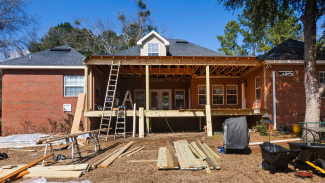
Home Improvements Trending Higher
by Brandon Miller on Oct 21, 2020
Due to COVID-19, Americans are spending more time at home than ever before, leading to a record amount of spending on home improvement.1
It’s not that big of a surprise since many Americans now find their homes are doing triple duty as a place to live, work, and learn. Homeowners are funneling more money into their homes than ever thanks to a surplus of cash they would typically spend in other ways. However, what is surprising is the amount being spent on home improvement projects.1
The average homeowner has spent around $17,140 during the pandemic to make their homes more enjoyable while sheltering in place. This increase is substantial compared to the 2019 State of Home Spending Report, where it showed the average spending on home improvement was $7,560. Additionally, studies show that 79% of homeowners begin their home improvement projects without a budget. This is an increase from 2019, where 75% of homeowners didn’t have a budget.2,3,4
Besides home offices, many Americans are taking to outfitting their backyards to make the most of their living space. Pools are one of the top requests for contractors, as it gives people a backyard addition that allows them to keep fit. Searches on Houzz.com are three times what they were a year ago, as more and more Americans look to their backyards to help them weather the pandemic.5
The increased need for building supplies has driven up the price—making items such as lumber harder to come by. Despite the scarcity of supplies, rock bottom interest rates and spending more time at home have made home improvement projects large and small attractive to homeowners.1,5
If you have upgraded your home recently or have any questions about financing a home improvement project, please give us a call. We're always happy to help.
This material was prepared by MarketingPro, Inc., and does not necessarily represent the views of the presenting party, nor their affiliates. This information has been derived from sources believed to be accurate. Please note - investing involves risk, and past performance is no guarantee of future results. The publisher is not engaged in rendering legal, accounting or other professional services. If assistance is needed, the reader is advised to engage the services of a competent professional. This information should not be construed as investment, tax or legal advice and may not be relied on for the purpose of avoiding any Federal tax penalty. This is neither a solicitation nor recommendation to purchase or sell any investment or insurance product or service, and should not be relied upon as such.
The opinions expressed in this article are for general informational purposes only and are not intended to provide specific advice or recommendations for any individual or on any specific security. It is only intended to provide education about the financial industry. To determine which investments may be appropriate for you, consult your financial advisor prior to investing. Any past performance discussed during this program is no guarantee of future results. Any indices referenced for comparison are unmanaged and cannot be invested into directly. As always please remember investing involves risk and possible loss of principal capital; please seek advice from a licensed professional.
Brio Financial Group is a registered investment adviser. Advisory services are only offered to clients or prospective clients where Brio Financial Group and its representatives are properly licensed or exempt from licensure. No advice may be rendered by Brio Financial Group unless a client service agreement is in place.
Citations:
1. NPR.org, September 11, 2020
2. Finance.Yahoo.com, August 11, 2020
3. Time.com, June 18, 2020
4. Barrons.com, August 13, 2020
5. NAHB.com, September 11, 2020
